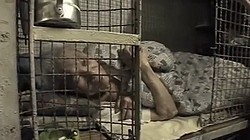
CNN: The Dark Side of Hong Kong, Where People Live in "Coffins"
 |
| Living in a coffin, source:youtube.com |
Mak's living space is roughly the size of a double bed. These apartments are referred to as coffins due to their extraordinary crampedness, while alternatives resemble cages or pens.
Twenty residents of the building where Mak lives share a toilet that also serves as a shower. Wires hang from the walls in the hallways, and the spaces are poorly ventilated. The living spots are stacked on top of one another as tightly as kitchen cabinets.
"People think that the residents of such places got into that situation because they are lazy. Nothing could be further from the truth. Some have very poorly paid jobs, even though they spend long hours working. They just fell on hard times," said social worker Sze Lai San.
Mak, who works as a janitor, is no exception. He was born in Hong Kong. After several unsuccessful financial investments, he went bankrupt and now barely earns enough for the monthly rent of 150 dollars (2,500 crowns). He is now one of the 1.2 million poor residents of Hong Kong. "I can go without lunch, ignore the dirt, endure the insects and the stuffiness, but the biggest problem is safety. We are packed in there like sardines without any supervision. If a fire starts there, we will all die," says Mak, who does not want to give his full name because he is too deeply in debt and fears that his creditors would find out his address.
According to municipal regulations, every owner renting out an apartment with 12 or more beds must have a license. Although it is incredible, the owner of the place where Mak lives has one.
The regulation only requires that rented apartments meet fire and safety regulations; it does not mention the conditions of living space. Hong Kong’s housing bureau spokeswoman Elain Chu says that living conditions are determined by many factors, including the market, the economy, the individual’s financial situation, and personal choice.
Sze attributes the phenomenon of living in coffins to the consequences of the revolution in urban property prices. Its cause is the gap between the rich and the poor, which is most pronounced in Asia. In Hong Kong, according to the consulting firm Savills, a square foot of property sells for an incredible 10,550 dollars (177,000 crowns), which must be multiplied by about ten for square meters. Even lower-quality properties in Hong Kong are 40 percent more expensive than in London, New York, or Moscow.
"Hong Kong is getting richer, but these people have been left behind. One of them once told me: 'I haven't died yet, but I already live in a coffin - four walls and nails,'" recalls Sze.
She has been working with people like Mak for 16 years. Residents of coffins pay more per square meter of living space than they would in luxury apartments. Since last year, prices for coffins have increased by 20 percent. "Regressive things are happening that shouldn’t be happening in Hong Kong. Residents of poor housing should have more rights; they shouldn’t live on the fringes of society," claims Sze.
300,000 people have applied for public housing. The official waiting time is three years, but many wait 10 years in their coffins.
From Mak's perspective, there are two Hong Kongs. The one he sees from his window that displays the glitz and beauty for which the city is known. And the one meant for people who have fallen through the cracks of that gilded facade. "It’s not true that the government doesn’t know how to help people like me. They don’t want to help us, just like they don’t want to address our problems," says Mak.
Note: See also video on this topic on the website youtube.com.
The English translation is powered by AI tool. Switch to Czech to view the original text source.
0 comments
add comment






